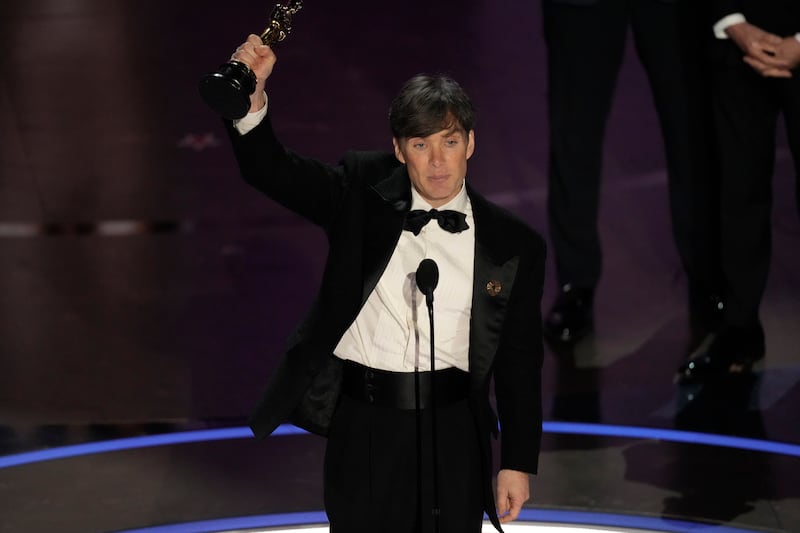Fáilte romhaibh you lovely host of loyal readers, you are more than welcome to the Bluffer’s Guide to Irish.
The success of the Kneecap film knows no bounds and last week it was announced that the film had earned an líon is mó ainmniúchán IFTA riamh - the highest number of IFTA nominations le haghaidh togra aonair - for a single project.
In all, the movie garnered 17 n-ainmniúchán - 17 nominations.
No wonder then, that TG4 and an Ciste Craoltóireachta Gaeilge - the Irish Language Broadcast Fund and others were celebrating, unlike Kneecap, with a nice cup of tea.
However, the westies weren’t alone in getting aitheantas - recognition.
Fréamhacha is the Irish word for roots and the film Fréwaka (geddit?) is another scannán Gaeilge - Irish language film, to earn plaudits, with three IFTA nominations so both films have received 20 nominations ar an iomlán - in total.
This, needless to say is a ringing endorsement of the people involved in making Irish language films as good as any in English.
With regards to the Kneecap movie, it has received nominations for an Scannán is Fearr - Best Film, an Stiúrthóir is Fearr - the Best Director award for Rich Peppiatt and an Script is Fearr - Best Script.
The three main lead actors J.J. Ó Dochartaigh DJ Próvaí), Liam Óg Ó hAnnaidh (Mo Chara) and Naoise Ó Cairealláin (Móglaí Bap) are up for gongs as a gcuid aisteoireachta - for their acting while in the film Michael Fassbender, Fionnuala Flaherty, Simone Kirby and Jessica Reynolds are named in rólanna tacaíochta - support roles.
The film’s technical achievements have been recognized with nominations for Choice Actors, Cinematography, Costume Design, Production Design, Hair and Makeup, Sound and Editing.
Then there are the BAFTAs and the Oscars to go with the myriad of other accolades that Kneecap has picked up.
One of the Bluffer’s favourite TV series of last year was Crá, a murder mystery set in the mesmeric Donegal Gaeltacht.
Crá captivated audiences when it was shown on the BBC and TG4 and it has received an IFTA nomination for Best Drama.
You can watch the series on the BBC iPlayer or at nasc.tg4.tv/CRÁ.
Fréamhacha on the other hand, has received nominations for Cinematography and Original Score, showcasing the film’s excellent visual and audio elements.
The horror film stars Clare Monnelly, Bríd Ní Neachtain and Aleksandra Bystrzhitskaya and was directed by Aislinn Clarke.
Fréamhaca was produced by Dermot Lavery for DoubleBand Films.
Another big TG4 IFTA nomination was Brendan Gleeson’s Farewell to Hughes’s, the famous music pub which the award-winning actor and fine fiddle player used to frequent.
The documentary has been nominated in the George Morrison Feature Documentary category.
The dissenting voices which condemned the founding of TG4 back in 1996 must be eating their words right now.
Cúpla Focal
líon is mó ainmniúchán IFTA riamh (leen iss moe anyimnookhaan ifta reeoo) - the highest number of IFTA nominations
le haghaidh togra aonair (le hiy togra ayner) - for a single project
17 n-ainmniúchán (shakht nanyimnyookhaan jayg) - 17 nominations
an Ciste Craoltóireachta Gaeilge (un kishta craytoreakhta) - the Irish Language Broadcast Fund
aitheantas (iyhantiss) - recognition
fréamhacha (frayoowaha) - roots
scannán Gaeilge (scanaan gayliga) - an Irish language film
ar an iomlán (er un yumlaan) - in total
an Scannán is Fearr (un scanaan is faarr) - Best Film
an Stiúrthóir is Fearr (un shtyoorahore is faarr) - Best Director
an Script is Fearr (un script is faarr) - Best Script
as a gcuid aisteoireachta (as a gudge ashtoreakhta) - for their acting
rólanna tacaíochta (rolanna takeeakhta) - support roles








